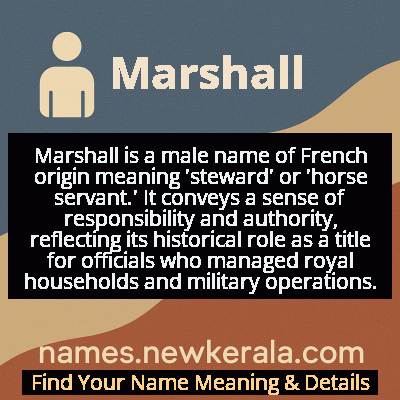Marshall Name Meaning & Details
Origin, Popularity, Numerology Analysis & Name Meaning of Marshall
Discover the origin, meaning, and cultural significance of the name MARSHALL. Delve into its historical roots and explore the lasting impact it has had on communities and traditions.
Name
Marshall
Gender
Male
Origin
French
Lucky Number
3
Meaning of the Name - Marshall
Marshall is a male name of French origin meaning 'steward' or 'horse servant.' It conveys a sense of responsibility and authority, reflecting its historical role as a title for officials who managed royal households and military operations.
Marshall - Complete Numerology Analysis
Your Numerology Number
Based on Pythagorean Numerology System
Ruling Planet
Jupiter
Positive Nature
Optimistic, inspirational, and creative.
Negative Traits
Scattered, exaggerating.
Lucky Colours
Yellow, gold, purple.
Lucky Days
Thursday.
Lucky Stones
Yellow sapphire.
Harmony Numbers
1, 2, 9.
Best Suited Professions
Arts, writing, communication.
What People Like About You
Creativity, optimism.
Famous People Named Marshall
Marshall McLuhan
Media theorist
Coined the phrase 'The medium is the message' and pioneered media theory
Marshall Bruce Mathers III (Eminem)
Rapper and songwriter
One of the best-selling music artists of all time, 15 Grammy Awards
John Marshall
Chief Justice
Fourth Chief Justice of the United States, established judicial review
George Marshall
Military leader and statesman
Nobel Peace Prize winner, architect of the Marshall Plan for European recovery
Name Variations & International Equivalents
Click on blue names to explore their detailed meanings. Gray names with will be available soon.
Cultural & Historical Significance
Throughout history, the title of Marshal became institutionalized in various contexts, from field marshals commanding armies to US Marshals serving in the American justice system. This evolution cemented the name's association with authority, protection, and organizational skill. The name carries with it centuries of cultural weight, representing the transition from feudal responsibilities to modern leadership roles while maintaining its core meaning of stewardship and reliable management.
Extended Personality Analysis
Individuals named Marshall are typically perceived as natural leaders with strong organizational skills and a sense of responsibility. They often exhibit qualities of reliability, practicality, and determination, reflecting the name's historical association with stewardship and management. Many Marshalls demonstrate excellent problem-solving abilities and tend to approach challenges with methodical precision, making them effective in both professional and personal contexts.
Their personality often combines traditional values with modern adaptability, allowing them to navigate complex situations with both authority and empathy. While they can be decisive and commanding when necessary, they typically balance this strength with fairness and consideration for others. This combination of traits makes Marshalls well-suited for leadership positions where both organizational skill and interpersonal sensitivity are required, embodying the ideal of the responsible caretaker that the name originally represented in medieval courts and households.
Modern Usage & Popularity
Marshall remains a popular given name in English-speaking countries, particularly in the United States where it has maintained consistent usage since the 19th century. While it peaked in popularity during the 1990s, it continues to rank within the top 500 male names in the US, appealing to parents seeking a strong, traditional name with professional connotations without being overly common. The name's usage spans various socioeconomic backgrounds and regions, with particular strength in the American South and Midwest. Its versatility allows it to work well in both formal and casual contexts, and its association with respected professions like law enforcement and military leadership contributes to its enduring appeal across generations.
Symbolic & Spiritual Meanings
Symbolically, Marshall represents authority, protection, and responsible stewardship. The name evokes images of guardianship and orderly management, reflecting its origins in overseeing royal stables and military operations. Metaphorically, it suggests someone who brings order to chaos, protects the vulnerable, and maintains systems of justice and organization. The name carries connotations of reliability and trustworthiness, symbolizing a bridge between traditional values and modern leadership. In psychological terms, it represents the archetype of the responsible caretaker or the capable administrator who ensures that systems function smoothly and people are protected, making the name particularly resonant in contexts requiring leadership, organization, and ethical responsibility.

